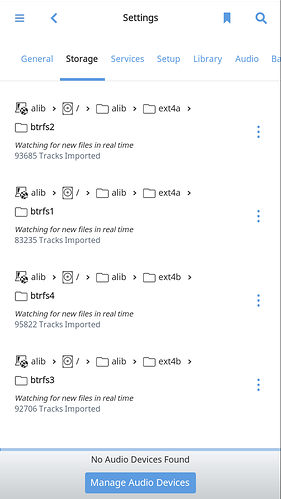As per thread title - does inclusion of the noatime parameter inhibit Roon’s ability to detect additions to one’s library?
Let’s ask @danny.
No. atime is for access, not changes.
Thanks @danny. Under what circumstances would Roon not detect changes then on ext4 formatted drives?
The drives on which my music is stored are mounted as follows:
/alib/ext4a ext4 defaults,noatime 0 0
/alib/ext4b ext4 defaults,noatime 0 0
Roon is pointed to the following:
When your Linux kernel is not firing inotify events. You out of inotifyhandles?
I’m not sure to be honest. Since the initial post I’ve restructured my library and pointed Roon sever only to /alib, in which two physical drives are mounted as /alib/ext4a and /alib/ext4b.
Roon still doesn’t detect changes without me forcing a rescan (which is why I’d previously had more granular watched folders).
cat /proc/sys/fs/inotify/max_user_watches returns 8192
How do I check whether I’m out of inotify handles?
Answered for myself and problem solved. Thanks for the pointer @danny. Changed the value to 524288 by issuing the following (Arch Linux specific):
echo fs.inotify.max_user_watches=524288 | sudo tee /etc/sysctl.d/40-max-user-watches.conf && sudo sysctl --system
There is no simple way to know if you are out. Roon uses one handle per file or directory anywhere in your watched folders. So, as a simple rule, if you have fewer handles than tracks you are certainly out.
I am not aware of any reason to not just always set it to the max value of 524288 like you did.
Each handle consumes a little ram but it’s no big deal. Moves/ additions are now detected instantaneously.
